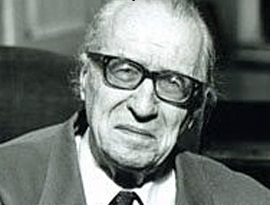Where do you see your father in today’s musical world?
I have noticed, with some saddened astonishment, that my father’s name is hardly ever mentioned in the French music press as one of the most important French composers of the 20th century.
Yet he was the most widely performed living French composer in the world and, judging by the feedback I get from his publishers and Sacem, the importance of programming his works worldwide has not diminished since.
Several of his works have even become classics of the repertoire, constantly played in many countries, such as the Clarinet Concerto, the String Trio, L’Horloge de Flore, the Wind Quintet No. 1 and many others.
If Jean Françaix was one of the most frequently played composers in his lifetime, and his name is less well known today, is there an explanation for this?
Contrary to what your question implies, his chamber music is played in many countries, including Asian countries, particularly South Korea, Japan and China,
However, his orchestral and operatic music, which made him so popular, has effectively disappeared from programmes, resulting in a lack of public awareness.
The programming of these types of music depends essentially on the initiatives of major musical institutions such as the great orchestras and opera houses.
These are undoubtedly these institutions that could best answer your question.
 And why have the Germans been more supportive than the French?
And why have the Germans been more supportive than the French?
The main publisher of his music, Schott, is German, which is the first explanation that springs to mind.
In this respect, it’s worth noting that this publisher was the first to see the promise of my father’s early works.
On two occasions, my father did not follow up on the publisher’s proposals, which was particularly commendable given that he was only 20 years old, preferring to wait in vain for those from his own country.
Schott mentions no performances between June and November 25. What could be done to increase the number of performances?
To date, the Schott concert calendar does indeed end on June 22, but this does not prejudge subsequent programming.
You may be surprised to learn that in 2012, the centenary year of his birth, we listed, on the Internet alone, over 600 concerts worldwide featuring one or more of his works.
It’s been said that Jean Françaix’s music is delightful and deeply French, or soft and urban. What would you say is the most dominant characteristic of his music?
I’d like to quote the words of composer Pierre Petit when he was awarded the Grand Prix SACD in 1983: « Grace and humor, clarity and modesty, tenderness and intelligence, all these were to be found, long before the last war, in works that were already the most exact and flattering portraits we could wish for of our own heritage. »
If I had to pick out just one word, I’d go back to Pierre Petit’s concluding words in his tribute: « This is happy music: this is the secret of the happiness that Jean Françaix’s music gives us at every moment. »
Roland-Manuel has said that your father felt at home in his time, while not following the modernists, whom Roland-Manuel criticized for pursuing the impossible through the pointless. Is it perhaps precisely this easy, ‘delicious’ character that keeps Jean Françaix’s music out of programs, because performers and program-makers are afraid of being accused of a certain anachronism?
At a recent concert I attended, one of my father’s orchestral works was played, the Ouverture anacréontique, a work with an anachronistic title if ever there was one! This concert was a real event, in view of what I have already said, since it had not been performed in France for several decades.
When the conductor asked the audience after the performance, they replied that they did not know the composer’s name, but when asked if they had enjoyed the music, they gave a comfortingly unanimous yes.
If there is an anachronism, it does not seem to have shocked the audience, and that can only be a good thing in these particularly chaotic and violent times.

Jacques Françaix
Your father is said to have considered the Apocalypse his best work. Do you share this opinion?
I share that opinion, and it is the work that makes the strongest impression on me. I’d even go so far as to say that, if he had only composed this work, it would be enough to rank him among the great composers.
The subtitle is ‘fantastic oratorio’. Can you explain the word fantastic in this context?
To tell the truth, I have never thought of asking him, and as far as I know, he has not said a word about it, so I cannot explain it to you, except in terms of the impression one gets when listening to it!
What is the significance of recording for France’s cultural heritage?
Of course, it’s essential as an irreplaceable tool for bringing the work directly to the widest possible audience.
It is all the more important in that, in the absence of projects from public structures, this recording would not have been possible without the private initiatives of Jean-Pierre Lo Ré and Eric Rouyer, with the heavy investments that this implies. I cannot thank them enough.
Le Palais des Dégustateurs has added the recording of the Piano Concerto with your father as soloist. Can you tell us a few words about this work and the interpretation?
This concerto is technically challenging, which may explain why it wasn’t as successful as the Concertino, the piece that launched my father’s career. However, it is on a larger scale in terms of length, yet is of comparable quality.
My father was considered a talented pianist. His teacher, Isidore Philipp, encouraged him to pursue a career as a soloist and even tried to dissuade him from devoting himself to composition.
However, he never abandoned the piano, regularly accompanying the renowned cellist Maurice Gendron and making recordings that are still considered benchmarks today.

Georges Prêtre
He even had the opportunity to play his Concertino under the direction of Herbert von Karajan.
He was therefore in the perfect position to perform his concerto, which he did on several occasions.
On the other hand, to my knowledge, he had only recorded it once, a year after composing it, and that was 88 years ago, under Nadia Boulanger.
The discovery, in the INA archives, of this public recording, ideally bringing together a composer-performer and a conductor as renowned as Georges Prêtre, was therefore a magnificent surprise, which this disc will help you discover.




















